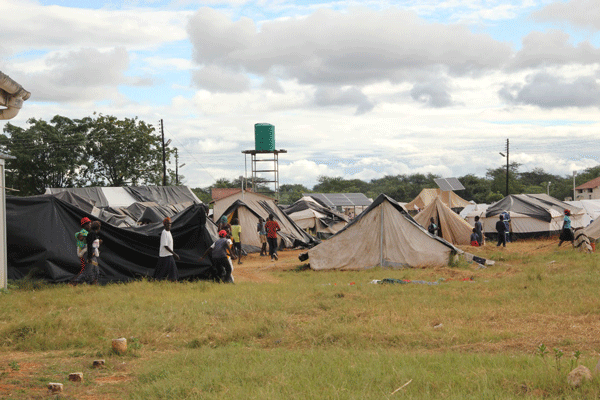
The National Aids Council (NAC) has come to the aid of Tsholotsho flood victims by providing essential HIV services at Sipepa transit camp where the families were accommodated.
By Tadiwa Nyatanga-Pfupa

Over 850 villagers who were displaced by floods at the start of the year were camped at Sipepa Clinic as government works on logistics to resettle them.
NAC in conjunction with the Ministry of Health and Child Care has been providing services such as HIV testing and counselling, voluntary medical male circumcision as well as behaviour change programmes for the villagers.
Some of the displaced villagers who are living with HIV and were on treatment prior to their displacement are also being provided with supplies of antiretroviral drugs to ensure they do not default.
The majority of the displaced villagers came to the camp with virtually nothing save for the clothes they were wearing on the fateful day of the floods which destroyed their homesteads.
NAC’s Tsholotsho district Aids coordinator John Zwelempi Ngwenya told journalists during a recent tour of Sipepa transit camp that the services were aimed at stopping the transmission of HIV in the camp as well as cater for those that already live with the virus.
“When people are displaced and are staying in such conditions, there is little control of their behaviour. That is where we are coming in to provide them with services,” he said.
- Chamisa under fire over US$120K donation
- Mavhunga puts DeMbare into Chibuku quarterfinals
- Pension funds bet on Cabora Bassa oilfields
- Councils defy govt fire tender directive
Keep Reading
Ngwenya added that NAC was also holding regular dialogue sessions with youths on HIV prevention and gender-based violence as part of the services being provided at the camp.
Recently, NAC held a sports gala where 2 000 villagers from Tsholotsho, including the flood victims, participated in various sports activities. Ngwenya said the sports gala was part of the broader combination prevention approach by NAC to deal with HIV in the district.
“The idea is to reach out to as many people as we can at one go. When you have 2 000 people gathered at one venue and you provide all those services to them, then you have a chance to cover a lot of ground,” he said.
Sister-in-charge at Sipepa Rural Hospital, where the transit camp has been established, Mejury Maphosa, said there were 63 clients on antiretroviral treatment at the camp.
She said the authorities at the health facility made efforts to identify people who were on antiretroviral treatment upon arrival at the camp two months ago and made arrangements to provide them with medication.
“We managed to identify 63 clients who are on ART and all of them were able to state their regimens. Five had their medicines with them and for those who didn’t have, we have made sure we provided,” she said.
Maphosa said Sipepa Rural Hospital was in the process of beefing up its antiretroviral drugs stocks which have been overwhelmed by demand due to the presence of flood victims. She, however, gave assurance that no one at the camp who prior to the floods was on antiretroviral treatment had defaulted treatment due to the displacement.
The sister-in-charge revealed that the health facility was also offering TB screening services for the flood victims.
“Three cases of HIV and TB co-infection were detected and the patients have since been put on medication. One case was from Jimila and it was in the intensive phase.
“Another case was from South Africa. The person was brought here after omalayitsha [cross-border transporters] found his home deserted,” she said.
Sipepa transit camp dwellers are expected to be relocated to Tshino and Sawudweni area in Tsholotsho soon.











